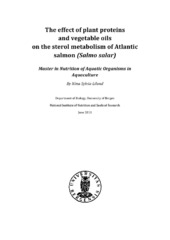| dc.description.abstract | To ensure responsible use of the valuable marine ingredients a major effort is being invested in understanding effects of replacing fish meal and fish oil partially or completely with plant proteins and vegetable oils in aquaculture diets. Decreased dietary n-3/n-6 ratio and cholesterol levels and the introduction of vegetable oil derived phytosterols may affect Atlantic salmon health as well as nutritional product quality. Atlantic salmon plasma cholesterol is naturally very high being more than twice the upper range for healthy humans (11 mM in salmon vs 5 mM for healthy humans). Increased plasma and LDL cholesterol is a known risk factor for the development of cardiovascular disease in humans and phytosterols are known to lower plasma cholesterol. In Atlantic salmon, however, the role of dietary phytosterols as cholesterol lowering agents is still unexplored. The aim of the study was to investigate if the cholesterol metabolism and plasma cholesterol levels were altered in seawater phase Atlantic salmon when fed diets with either fish oil (FO) or vegetable oil (VO) based feeds for 6 months. The fish were fed diets with a high and constant inclusion of plant proteins, and either fish oil (FO) or 80 % of the FO replaced by olive oil (OO), rapeseed oil (RO) or soybean oil (SO). These oils were selected for their different levels of phytosterols and n-3/n-6 ratios to make it possible to determine whether it was the sterol composition of the feeds or the fatty acid composition being the main factor affecting fish cholesterol metabolism. Neither plasma nor lipoprotein cholesterol differed at any sampling point between Atlantic salmon fed the different experimental diets, indicating that cholesterol levels is metabolically regulated also in Atlantic salmon. Phytosterols tended to accumulate in liver, especially in the fish fed RO, which was the diet with the highest content of phytosterols. An increased mRNA expression of genes encoding for proteins involved in cholesterol synthesis (ACAT2, DHCR7 and SREBP2) was observed in VO fed fish. Higher triacylglycerol levels in the liver, as well as a slightly elevated VLDL cholesterol and protein was seen in the RO fed fish compared to the other dietary groups. The changes observed in the RO fed salmon are thought to be caused by lower absorption of dietary cholesterol in this dietary group, caused by an influence of phytosterols on the intestinal sterol-absorber NPC1L1.The results from this study indicate that as long as Atlantic salmon is fed vegetable ingredient based diets low in cholesterol, cholesterol synthesis is up regulated, and dietary phytosterols does not affect the plasma nor lipoprotein cholesterol levels further. However, a high phytosterol-low cholesterol diet, as provided by the RO feed, does have a significant effect on the lipid and sterol metabolism on these fish, possibly due to a cholesterol deficit. | en_US |
